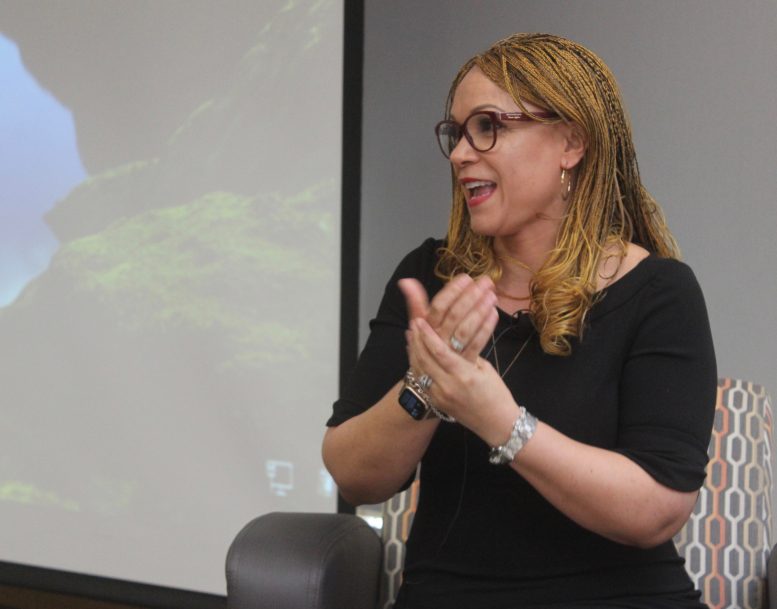By JAN LARSON McLAUGHLIN
BG Independent News
Melissa Harris-Perry has little tolerance for people who woke up horrified in November 2016 after President Donald Trump was elected. She finds it hard to sympathize with people who realized at that moment that they were living in a country where racism and sexism wielded great power.
That wasn’t news to Harris-Perry. Nor to many Black Americans.
“We are living in a harsh and painful time,” the television host, political commentator and professor said Wednesday evening at Bowling Green State University.
“More than half of Americans believe this is the lowest point in our nation’s history,” she said.
But Harris-Perry said she refuses to betray her grandmother and great-grandmother, “by claiming that this is the hardest, that this is the lowest, that this is the worst.”
Harris-Perry presented “Power of the Word: Language, Voice and the Legacy of King in Our Work” as part of BGSU’s “Beyond the Dream” series.
She used powerful words to convey her message. She warned that her talk would cover some difficult terrain, and her PowerPoint projected the word “BREATHE” as a regular reminder to the audience.
Harris-Perry suggested that the audience adopt the analytic tool of “#BlackGirlSkepticism,” in their everyday lives.
While some Americans had a hard time getting out of bed after the 2016 election, Harris-Perry said she struggled to get up the day in 2013 after George Zimmerman was found not guilty of killing Trayvon Martin.
She has a hard time looking at the photos of the men who murdered Emmitt Till, celebrating with their wives after they were acquitted. She is haunted by the photos of Ruby Bridges being escorted by federal marshals as she leaves the all-white school at the end of the day.
It was people who used their voices to bring about change for civil rights. And leading the charge was Dr. Martin Luther King Jr.
“When we talk of Dr. King, we tend to think about his words. You hear his voice,” Harris-Perry said.
“There were much more capable strategists around him,” but King was the master storyteller, she said. And he knew how to use the new media of the day – TV.
“He would currently tear up on Twitter,” she said.
Those who didn’t use words in the fight for civil rights, expressed their voices with their bodies.
“Voice was always about more than speaking,” she said.
Rosa Parks knew that as she sat down on a bus in Montgomery.
“She wasn’t tired at all,” Harris-Perry said. “The only thing she was tired of was injustice.”
The Freedom Riders on buses and the people staging sit-ins at diners spoke with their actions – as do athletes now when they raise their fists in the air or kneel during the National Anthem.
But there is often a price to protesting the status quo.
“We lie about the costs of speaking out,” Harris-Perry said. “The Civil Rights Movement was not non-violent.”
Nor is speaking out necessarily empowering. She pointed to Anita Hill, who testified against Supreme Court nominee Clarence Thomas.
“All of us can be willing to overlook injustice,” Harris-Perry said of those who refused to listen to Hill.
“The world will not necessarily rush to support you,” she said.
But protesting means a certain level of optimism exists, she added.
Even the words of the founding fathers – slave owners themselves – established higher standards. In the Declaration of Independence, they spoke of all men being created equal. Those aspirations have not yet become reality, she said.
“You wrote us a check and it bounced,” Harris-Perry said.

